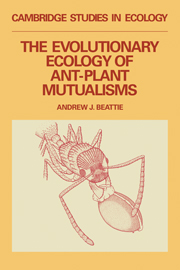Book contents
- Frontmatter
- Contents
- Preface
- 1 Introduction
- 2 Origins and early evolution of ant–plant mutualisms
- 3 Plant protection by direct interaction
- 4 Plant protection by indirect interaction
- 5 Myrmecotrophy
- 6 The dispersal of seeds and fruits by ants
- 7 Ant pollination
- 8 Food rewards for ant mutualists
- 9 Variation and evolution of ant–plant mutualisms
- References
- Index
- Frontmatter
- Contents
- Preface
- 1 Introduction
- 2 Origins and early evolution of ant–plant mutualisms
- 3 Plant protection by direct interaction
- 4 Plant protection by indirect interaction
- 5 Myrmecotrophy
- 6 The dispersal of seeds and fruits by ants
- 7 Ant pollination
- 8 Food rewards for ant mutualists
- 9 Variation and evolution of ant–plant mutualisms
- References
- Index
Summary
When van der Pijl (1955) reviewed the relationships between ants and plants he perpetuated a number of terms, most of which were first proposed by Warburg (1892). These included myrmecophily for ant pollination, myrmecochory for ant dispersal of seeds, and myrmecotrophy for the feeding of ants by plants, principally by means of extrafloral nectaries. Because myrmecotrophy involves much more than the feeding of ants and has largely been replaced by the concept of ant protection of plants, I intend to put the term to another use. If the subject–object relationship of these terms remains consistent, then myrmecophily denotes the relationship in which ants benefit plants by acting as pollen vectors, myrmecochory describes the benefit to the plant conferred by ants dispersing seeds, and myrmecotrophy implies a relationship in which ants benefit plants by feeding them. As far as I can tell most biologists were unaware of this possibility at the time of van der Pijl's review. Since then, however, the existence of ant-fed plants has been documented.
The nutritional benefit to the plants has been clarified for two Rubiaceous genera from Southeast Asia and northern Queensland that house ants in large tubers derived from the embryonic hypocotyl (see Table 7). Janzen (1974b) observed that the ant Iridomyrmex myrmecodiae abandons the remains of prey in some of the cavities that ramify the tubers of Hydnophytum formicarium and Myrmecodia tuberosa (Figure 8). These cavities are lined with absorptive tissues.
- Type
- Chapter
- Information
- The Evolutionary Ecology of Ant–Plant Mutualisms , pp. 66 - 72Publisher: Cambridge University PressPrint publication year: 1985



